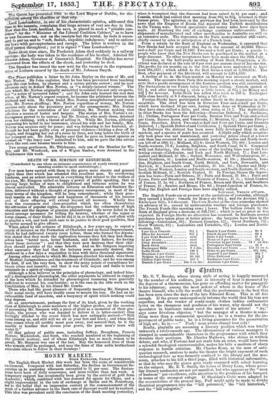tt 'aratrtg.
Mr. Cl. V. Brooke, whose strong style of acting is happily measured by the number of his auditors, just as intensity of heat is measured by the degrees of a thermometer, has gone on affording matter for panegyric to his admirers; among tho most ardent of whom is the lessee of the theatre himself, who tells the world that the performance is the best that has been seen since the days of the late Edmund Bean. This is all fair enough. If the grocer unscrupulously informs the world that his teas are superfine, and the vender of ready-made clothes indites enthusiastic lyrics on the cheapness and goodness of his wares, why should not the speculator in histrionic talent extol the merit of his artists? "Ay," says some frivolous objector,- "but the manager of a theatre is some- thing more than a commercial speculator ; he is a trustee for the im- provement of public taste; he is a living guarantee for the preservation of high art ; he is-" Pooh ! nous avons chang6 tout oda !
Really, playbills are assuming a literary position which was totally unknown a twelvemonth ago. The idiosyneracy of various managers is stamped in unmistakeable characters in the programmes with which they decorate their porticoes. Mr. Charles Mathews, who shines in written debate, and who, if Fortune had not made him an actor, would have been a splendid theological controversialist, makes his bills a medium of sharp response to hostile criticism. Mr. Charles Kean, as the man of anti- quarian research, anxious to make his theatre the bright exponent of such archteological lore as was formerly confined to the library and the mu- seum, attaches to his bill a third page, filled with historical information, so that he who sees the pieces goes ready crammed with select learning on the subject. Mr. E. T. Smith, the lessee of Drury Lane, whose pecu- liar literary tendencies are not yet manifest, but who appears as the man of business" par excellence, calls attention to the goodness of his banquet in terms of the strongest eulogy. If Sheridan's Critic were adapted to the eccentricities of the present day, Puff might aptly be made to divide theatrical programmes into the "bill polemical," the "bill historical," and the "bill eulogistic."


























 Previous page
Previous page